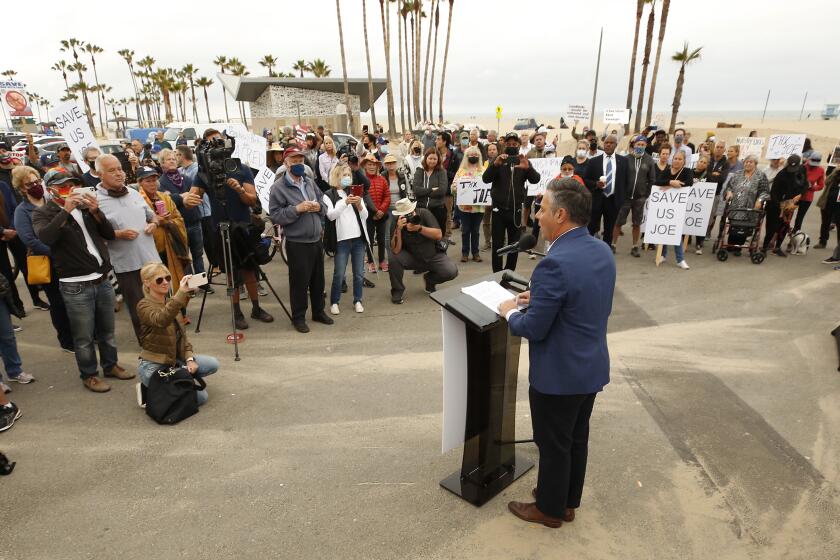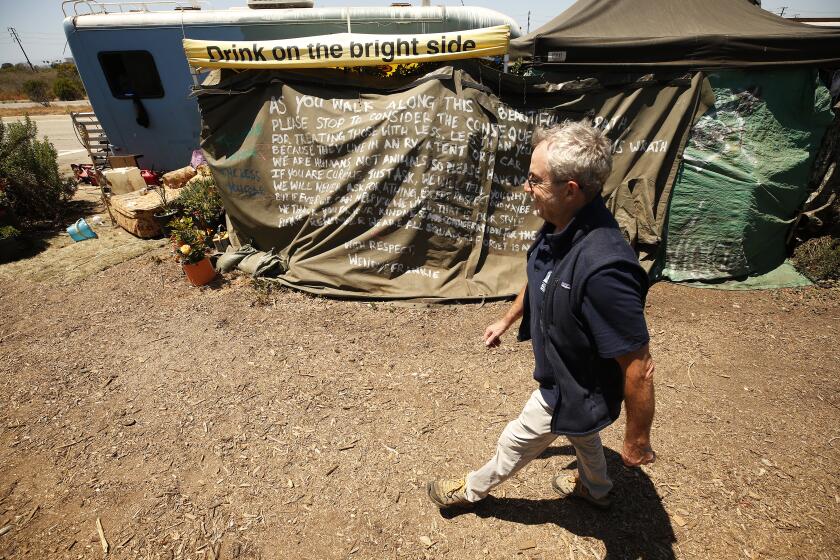Column: Ban homeless encampments everywhere? It might have more support than liberals think
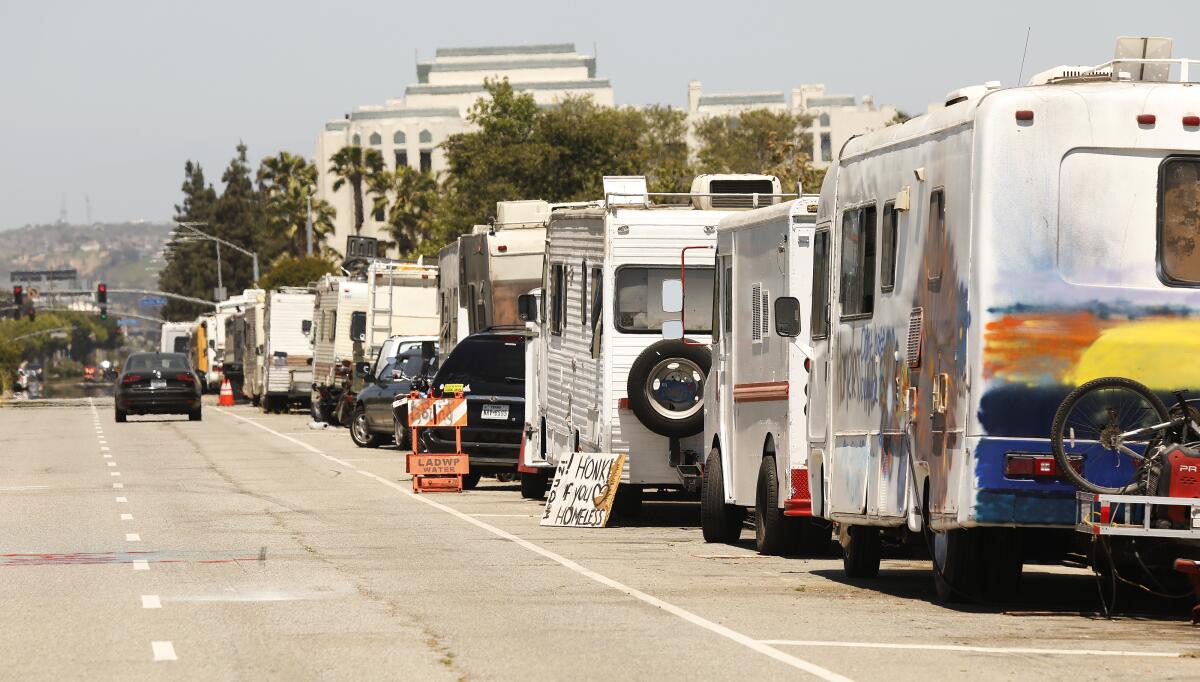
- Share via
Scott Culbertson is conflicted. Not to mention frustrated. And sad. And disappointed. And, frankly, just fed up.
Angelenos, I suspect many of you can relate.
For almost two years, the executive director of the Friends of Ballona Wetlands has watched with dismay as an encampment of broken down RVs and buses has become a permanent fixture along Jefferson Boulevard, just west of Lincoln Boulevard in Playa del Rey.
When I spoke to Culbertson over the summer, he told me how the few dozen occupants had been making frequent incursions into the Ballona Wetlands Ecological Reserve and adjacent freshwater marsh, leaving mounds of trash and causing brushfires.
Not a whole lot has changed since then. If anything, it has gotten worse, both in terms of the environmental damage and the equally obvious, but far less measurable — and far more important — human suffering. I live nearby and see it every day.
Culbertson had pinned his hopes on promises by the city to do regular cleanups of the encampment. And for the most part, the city has followed through. It just doesn’t look like it.
“Everybody who is living along there, they know the game now,” he told me a few hours after a pointless pre-Thanksgiving cleanup. “As soon as the L.A. sanitation workers leave, everybody puts their stuff right back out.”
These past few months have left Culbertson at a loss for what do next, other than wait for action on a couple of new city policies that could beef up enforcement.
“Even the most liberal folks, like me, have begun to lose patience with the homelessness situation,” he admitted.
::
I thought about my conversation with Culbertson while listening to L.A. City Councilman Joe Buscaino on Tuesday, as he pitched a specious ballot measure that would bar homeless people from sleeping or camping in all public spaces if they have turned down shelter or housing.
“We all agree that the only solution to homelessness is housing,” he told his fellow council members. “Why would we continue to allow someone to continue to live on public property if a safer, healthier alternative is available? When we allow camping in public even when safer alternatives exist, we’re allowing someone’s addiction to take their lives.”
Buscaino wants to give whoever is mayor the authority to waive land-use and zoning rules “to urgently site homeless housing projects,” and ramp up the construction of emergency shelters.
“Contrary to what you’re hearing from advocates and others, this is not criminalizing someone for having no place to sleep,” he said Tuesday. “If there’s no appropriate shelter available, there will be no enforcement.”
Buscaino claims he is being driven by “mercy” and “compassion” for the tens of thousands of Angelenos who are living on sidewalks and under freeway bridges. But he also is running for mayor on a platform of cracking down on encampments.
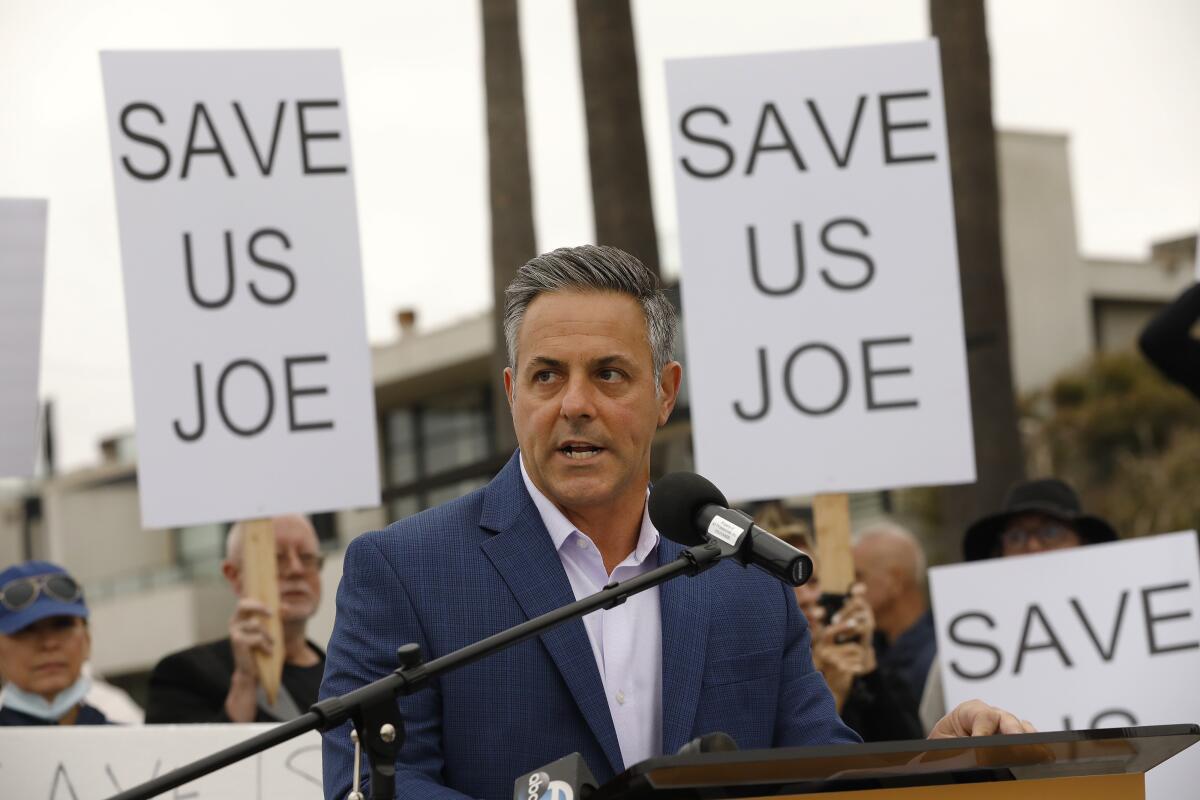
Moreover, he has a habit of insinuating that most homeless people won’t accept help because they are struggling with drugs or mental illness when, in reality, many are just too poor to afford housing. So there are plenty of reasons to question the purity of his motives.
It’s not entirely surprising, then, that the City Council punted. Rather than approve or reject Buscaino’s request to have the city attorney draft language for his ballot measure, they shipped it to the Homelessness and Poverty Committee for an overhaul.
Some, including Councilman Mike Bonin, were particularly uneasy with its focus on enforcement and the prospect of forcing homeless people, en masse, into temporary emergency housing.
“Do we want to solve homelessness? Or do we want to address the problem of homeless encampments? This does the latter,” he said of the proposed ballot measure. “Homeless encampments are unacceptable, and they’re unsafe and they’re unsanitary. But the way to get rid of homeless encampments is to get rid of homelessness ... by giving people housing.”
If only L.A. were ready for all that.
In response to the council’s action, Buscaino’s campaign vowed to collect the 65,000 signatures necessary to put the measure before voters on the June 2022 ballot. He also criticized his colleagues in a campaign email, saying they “are more interested in the right to sleep on the sidewalk than the right to housing.”
Buscaino’s measure would prohibit people from sleeping or camping on sidewalks and other public spaces if they have turned down offers of shelter.
What’s striking about this rhetoric is how similar it is to what Sacramento Mayor Darrell Steinberg has been saying lately. And Steinberg, in contrast to Buscaino, is known in political circles for having compassion for the unhoused, both as author of California’s Mental Health Services Act and as co-chair of a statewide task force on homelessness.
Earlier this month, the mayor introduced what he calls a “right to housing.” It would require the city to provide enough permanent housing or, more likely, temporary shelter — be it sanctioned tent cities, hotel rooms or tiny homes — for every homeless person by 2023 or face possible lawsuits.
In return, homeless people would be required to accept whatever shelter or housing is offered by outreach workers. No cops would be involved.
Steinberg’s plan has gone over better with the Sacramento City Council than Buscaino’s has with the L.A. City Council. But in both cities, homeless activists and progressives are united in their opposition.
“I understand the fear ... that this is just a hidden way to deal with the tent encampment issue and clean up the city,” Steinberg said during a recent council meeting. “My motive is not to make life harder for people, it’s to get people indoors because I think living outdoors in these tent encampments is horrible.”
And like Buscaino, he also has criticized those who would defend the right for people to sleep outdoors.
Indeed, up and down the state, elected officials are trying to figure out what to do with encampments. The degrees of aggressiveness vary. But they all want to be able to move lots of unhoused people from where they are to other mostly temporary locations, and then clean the streets.
The trend seems driven by a collective understanding that this (mostly) post-pandemic reality of homeless people living everywhere is unsustainable. And more importantly, it’s also a tacit admission that, despite the valiant politicking and taxpayer dollars being spent, the permanent and affordable housing that California’s elected officials keep promising as a solution will likely take years, not months, to build.
In that way, the difference between what Steinberg wants to do and what Busciano wants to do is basically splitting hairs. As it is with what L.A. is already doing by authorizing the clearing of specific encampments around parks and libraries after offering all of the occupants housing or shelter.
There are legitimate questions about whether any of this will turn out to be legal. The Boise vs. Martin decision forbids the ticketing or arresting of homeless people for sleeping or camping on public property unless there is shelter available as an alternative. These answers will come in time.
A growing encampment has left significant damage in the freshwater marsh. But that’s no reason not to be sensitive to the needs of homeless people.
More immediately, though, there are moral questions that must be answered by Californians.
Does it make sense to pour most of our resources into permanent and affordable housing? Or does it make more sense to invest in emergency shelters, tent cities and tiny homes?
Is it humane to allow people to live, get sick and too often die in encampments, knowing they will likely wait years for housing? Or is it more humane to come up with legally dubious ways get people into shelters, even if it’s sometimes against their will and requires an intervention by law enforcement?
Like Culbertson, I’m conflicted. I realize it every time I drive by those RVs parked along Jefferson Boulevard and see a homeless person stumble from between them into traffic.
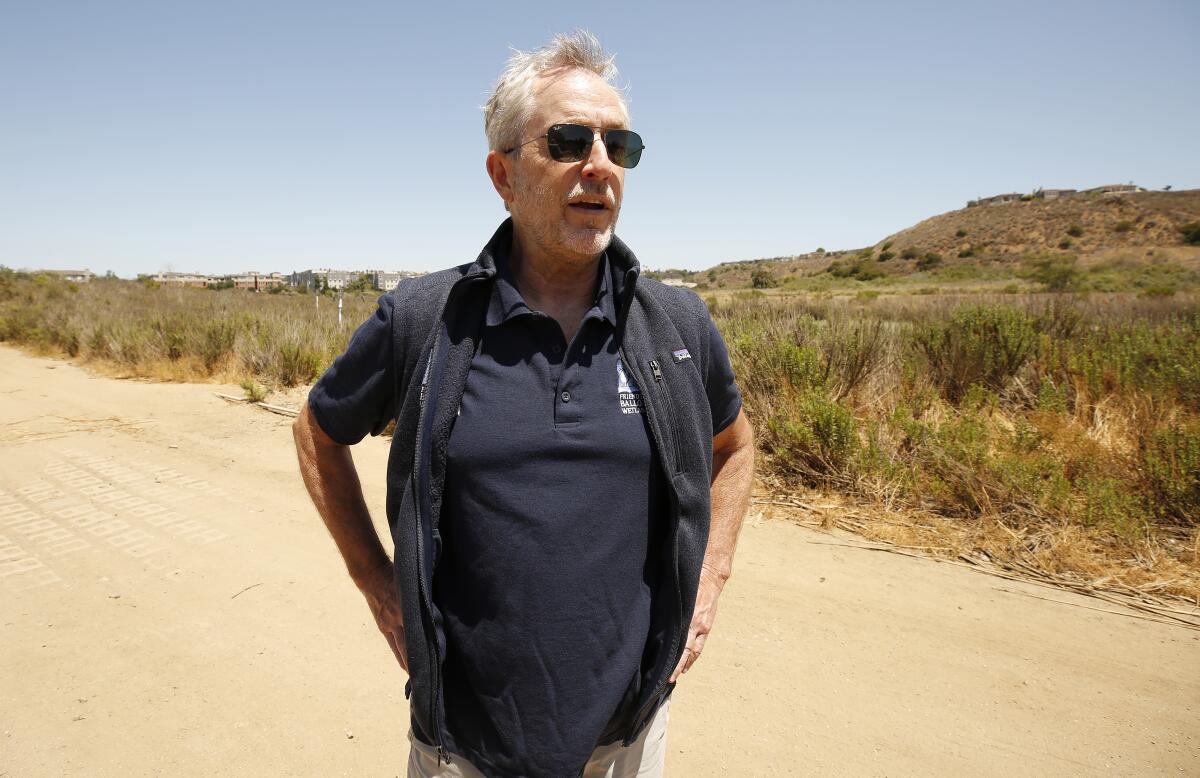
I do know that the criminalization of homelessness, whether issuing tickets or something more drastic, isn’t the answer to anything.
“I don’t know what enforcement means,” Culbertson told me. “I hope it doesn’t mean arresting people, because arresting someone for illegal encampments doesn’t solve the problem. It just moves the problem from my house to your house.”
He doesn’t think clearing encampments, a few at a time, willy-nilly-style, is the answer either. And I agree.
“Just moving someone off the sidewalk doesn’t solve the problem. It solves the problem for the business that has that tent on their sidewalk, but it doesn’t solve the problem for the next business.”
The answer, Culbertson says, is housing. Definitely permanent and affordable housing. Homeless people deserve it, just like everyone does. And homeowners have to be willing to accept it being built in their neighborhoods.
But is it a realistic answer? Can L.A. build housing at the scale and speed that’s needed to make a difference? He’s unsure.
“During the pandemic, you’ve had to make allowances because there was just not a lot anyone could do. But the city has a lot of money to deal with the homeless problem and there has been very little permanent housing built.”
Culbertson sighed deeply.
“I think we’re all frustrated.”
More to Read
Sign up for Essential California
The most important California stories and recommendations in your inbox every morning.
You may occasionally receive promotional content from the Los Angeles Times.
